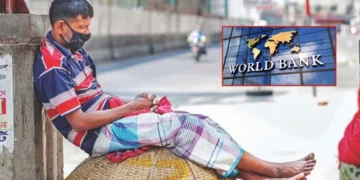In the first eight months of the 2024–25 fiscal year, private sector bank lending in Bangladesh has been severely stagnated, with growth dropping to its lowest level in 21 years. Experts have raised concerns about the economic factors behind this issue, including political instability, rising interest rates, and weak investment conditions, all of which have negatively impacted economic growth and loan disbursements.
Loan Growth Plummets to a 21-Year Low
According to recent data from Bangladesh Bank, private sector loan growth in the first eight months of FY25 was only 2.63%. This is nearly half of last year’s growth rate of 5.53%, marking the lowest growth in two decades. By the end of February 2025, total private sector loans had risen to Tk16.84 trillion ($153.36 billion), up from Tk16.41 trillion ($149.49 billion) in June 2024.
However, this increase is not due to loan disbursement, but rather to rising interest rates and the addition of suspended interest payments. Experts believe that companies, particularly small and medium-sized enterprises (SMEs), are dealing with high finance expenses.
Read More: Indian Rupee Falls Against the Dollar Amid Rising Tensions
High loan rates put a pressure on your finances.
Interest rate increases have been a major contributor to the slowdown in private sector lending. Interest rates ranging from 9% to 16% have driven up corporate costs and discouraged investment. Dr. Selim Raihan, executive director of SANEM, indicated that high interest rates had hampered growth and increased the risk of non-performing loans. Furthermore, the tight monetary policy designed to prevent inflation has worsened the private sector’s challenges.
As a result, banks are now turning to safer, more profitable alternatives, such as government treasury bills and bonds, which offer interest rates between 11% and 13%. This change has caused a significant decrease in private-sector lending.
Political instability and a bad investment climate
Political instability is another key issue that influences economic growth
Bangladesh has struggled to maintain stability after the government shift in August 2024, increasing fears about domestic and international investment.
Syed Mahbubur Rahman, managing director of Mutual Trust Bank, stated that without political stability, businesspeople are more concerned with sustaining their existing enterprises than investing in new ventures. The uncertain environment is making it difficult to secure long-term investments.
Foreign investors are also holding back due to concerns about political instability. Zaved Akhtar, president of the Foreign Investors’ Chamber, stated that improvements in the customs and taxation systems, as well as the overall business environment, are needed to attract foreign investment.
According to data from the Bangladesh Bank, capital machinery imports have declined by 26.02%, indicating a slowdown in industrial development. Imports of raw materials and intermediate items have also fallen. The lack of critical minerals reduces manufacturing production capacity, requiring many sectors to run below capacity.
Experts warn that this situation could have a long-term harmful impact on industrial growth. The paucity of sufficient machinery and raw materials prohibits factories from operating to their maximum potential, resulting in job losses and economic stagnation.
Exports Suffer and Employment Declines
In addition to stagnating loan growth and industrial slowdown, Bangladesh’s export sector has also faced difficulties. The country’s export earnings fell sharply in April 2025, with the woven textile sector losing 4.65%. However, the knitwear export sector increased by 5.08%. Despite a positive growth in exports throughout the first ten months of FY25, April’s performance should serve as a wake-up call for the government and business leaders.
Meanwhile, unemployment rates are rising, with 2.66 million unemployed persons expected by the third quarter of 2024. This increase in unemployment, paired with a decrease in labour force participation, reveals deeper concerns impacting the country’s economy.
Source: Dhaka Tribune
Share via:



















